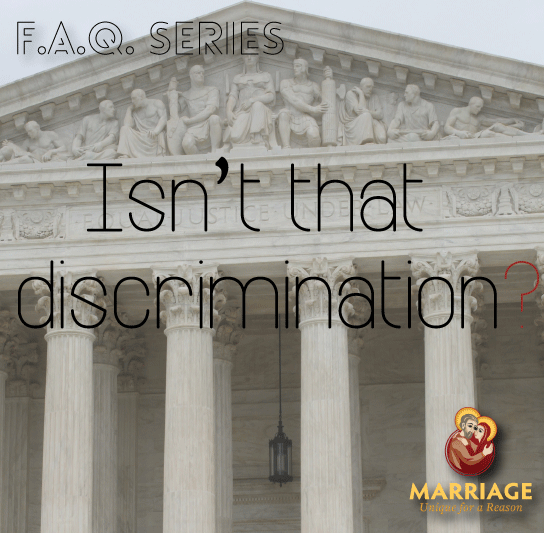In the last of the 5-week series, MUR is going over the FAQ #10 in Section 3: But isn’t it unjust discrimination to not allow two men (or two women) to marry?
The word “discrimination” is most often used to speak of the unjust treatment of persons based on race, sex, age, or disability. Indeed that has become the first definition of the word today, according to the Merriam-Webster Dictionary (and others). We are taught from a young age that it is wrong to discriminate and that we should always seek to be inclusive and aware of our biases or prejudices. While unjust discrimination is still a serious problem in the U.S., the question of redefining marriage is unrelated to it.
Like most words, discrimination has multiple meanings. Marriage law always contains a certain type of discrimination because it makes distinctions. The second definition of discrimination is: “the ability to understand that one thing is different from another thing.”[i] That certainly describes noting the distinction between marriage and any other type of sexual relationship. There is a difference, and this difference is worthy of recognition by everyone, including the government. Acknowledging the real and essential differences between types of sexual relationships is not discriminatory.
It is not discrimination if a person who cannot swim is rejected for a position as a lifeguard or swim instructor. It is not discrimination when a man who cannot lift 25 pounds is not hired as a piano mover. And it is not discrimination when a man is not permitted to play in a women’s tennis tournament. In the same way, noting that two men or two women cannot be the procreative, comprehensive union that marriage is, is not (unjust) discrimination.
Only a man and a woman are capable of sexual activity that may yield children. The government has a strong interest in protecting the right of those children to a mother and a father and in reducing the likelihood that those children will become wards of the state. The civil law of marriage (until recently) served both these interests by legally bonding adult couples to any children they may create, and to each other.
On the other hand, the sexual activity of two persons of the same sex never yields children, so the government does not have a very compelling interest in getting involved. The government does not care who your best friend is; you don’t need a license for friendship or cohabitation. It would be eminently reasonable, and in no way unjust, for law to distinguish between same-sex and opposite-sex relationships.
Likewise, it is reasonable that a professional serving a customer can distinguish between activities that express approval for same-sex sexual behavior and those that do not. The cases discussed in the next section deal with people who happily served each of their customers, with no thought to the person’s “private” life, until they were asked to do something directly celebrating their sexual relationship. These people simply declined to celebrate what they consider to be immoral behavior.
[i] “Discrimination.” Merriam-Webster Dictionary. http://www.merriam-webster.com/dictionary/discrimination (accessed February 3, 2016).

[…] (source: FAQ Series: Isn’t that Discrimination?) […]
Thanks for the post! Just to clarify, the FAQ series is written by staff of the USCCB, not the bishops themselves (unless otherwise noted!)
Protecting the institution of marriage as between a man and a woman is NOT discrimination against those who live by alternative lifestyles. Primarily because marriage is not a right; it is a privilege. Marriage requires a license and, up until last year’s devastating blow to the institution of marriage by the Supreme (ly stupid) Court, the license upheld that marriage be defined as between a man and a woman. Since marriage is a privilege and not a right, the litmus test of “it is a right” does not apply. To reinforce this notion, ask yourself if you would concede to having surgery by an unlicensed surgeon, or have an unlicensed attorney argue your case. Probably not. Does this mean you would be discriminating against those unlicensed people because you chose to contract a licensed professional? How about issuing a driver’s license to a blind woman? Should we issue such a license because we don’t want to discriminate against blind people? I honestly believe the court’s decision was more politically motivated than appropriately and legally argued which is the paramount role of the Supreme Court. Had it been not politically shoved down our throats, traditional marriage would still stand today as the cornerstone of our society rather than the all-inclusive appeaser for those who choose to live a lifestyle that is an abomination to God.
While there are many things I could reference here I will only mention the legal benefits of marriage such as taxes and retirement benefits, etc that are available to spouses and not available to “friends”.
And BTW the God I believe in does not think I am an abomination…he loves me.
Thanks, Kim. Of course God loves you– that is never in question.